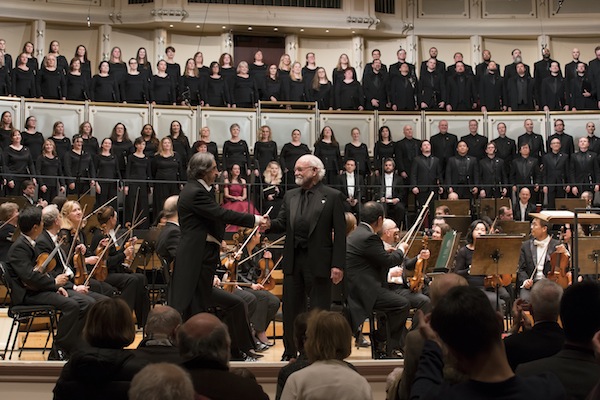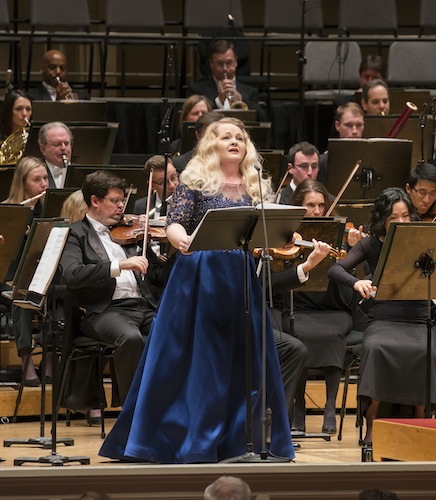CSO Chorus marks 60 years of excellence with Schubert mass

It was 60 years ago this month that the Chicago Symphony Chorus made its debut. Mozart’s Requiem was the vehicle and Bruno Walter was on the podium. Three weeks later the chorus was heard in Verdi’s Requiem, conducted by Fritz Reiner—the legendary CSO music director who had persuaded Margaret Hillis to come to Chicago to found a professional chorus to perform with his orchestra.
Like the Chicago Symphony Orchestra itself, the rarefied standard of the CSO Chorus has remained undimmed from its earliest years. Honed by the task-masker Hillis into a gleaming, pinpoint-precise ensemble, the chorus can still convincingly handle repertory from Bach, Handel and Mozart to Brahms, Prokofiev and contemporary music with equal technical assurance, clarity of articulation and corporate virtuosity.
Duain Wolfe–now in his 24th season as director of the CSO Chorus–has clearly maintained Hillis’s elevated standards, as shown in the resplendent performance of Schubert’s Mass in E flat major Thursday night, led by Riccardo Muti.
Schubert’s sixth and final work in the genre, the Mass in E flat is also his greatest. Completed three months before the composer’s death at 31, D950 is hardly a work of heavenly peace. An anguished intensity dominates more than spiritual solace, with dislocating harmonic shifts and stern, pitiless writing for chorus and orchestra that reflect the bleak gaze into the abyss of Schubert’s final piano sonatas, composed around the same time.
From the three trombones that open the Mass (noble playing by Jay Friedman, Michael Mulcahy and Jared Rodin, from the Indianapolis Symphony on bass trombone), Muti led a performance that conveyed the remarkable ingenuity, expressive depth and audacity of this music (only performed previously by the CSO in 1975 under Carlo Maria Giulini).
Tempos were ideal and balancing characteristically immaculate, though at times one would have liked the CSO’s music director to relax some of his firm control to allow the massive choral fugues to really soar.
The vocal soloists take a back seat to the chorus in this work but the superb singers (soprano Amanda Forsythe, mezzo Elizabeth DeShong, tenors Paul Appleby and Nicholas Phan and bass Nahuel Di Pierro) made the most of their highlighted moments. The trio of the Et incarnatus est was radiant and the lovely, contrasted timbres of the solo quartet provided apt consolatory expression in the Benedictus. The Argentinian bass Di Pierro’s subterranean voice made glowing impact in the Dona nobis pacem.
But the night belonged, as it should, to the CSO Chorus. One hundred and fifteen strong, the singers delivered refined and extraordinary corporate singing that conveyed the lieder-like ease of the opening Kyrie and hard-won peace of the Dona nobis pacem as surely as the majestic fugal power in the Gloria and Sanctus.
The centerpiece of the evening was the world premiere of Three Lisel Mueller Settings by Max Raimi, a longtime member of the orchestra’s viola section. Mezzo-soprano DeShong was the soloist, making her CSO debut.
Raimi has been a dedicated admirer of Mueller’s writing. (He previously scored four other Mueller poems, also for mezzo soloist, in 2002 for the Ars Viva Orchestra.) Winner of the 1997 Pulitzer Prize for Poetry, Mueller is currently 94 and a Lake Forest resident.
For this 15-minute mini-cycle, Raimi has set three of Mueller’s poems. The first setting, “The Story” depicts a horrific marriage; the second, “An Unanswered Question,” tells of an aboriginal Tasmanian woman who has been cruelly displayed in a cage in 19th-century London, as she wonders at the laughter and gibberish of the onlookers; the final setting, “Hope,” in Raimi’s words, reflects its “essentially irrational yet deeply spiritual nature.”

Each of the three songs has prominent obbligato passages for a trio of Raimi’s first-chair colleagues: clarinetist Stephen Williamson, bassoonist Keith Buncke and double-bass Alexander Hanna. The solo playing by each was most effective, especially the half-crazed careening of Williamson’s clarinet in the first song and Buncke’s meandering eloquence in the second.
Unfortunately, Raimi’s unsubtle music rarely illuminates Mueller’s evocative imagery. More crucially, the vocal writing lacks essential contrast and variety, centered on repetitious ascending lines that never coalesce into a broader, deeper expressive palette.
The souped-up orchestral writing is fixated on drumming and percussion (including “medium-sized lead pipe stuck with hammer”). Raimi keeps the soloist’s lines clear and prominent to his credit, yet the alternating over-scored forces too often break out into bursts of brutal and deafening cacophony. In the fleeting sparer passages, Raimi’s music is somewhat more successful, though the didactic spoken lines of “Hope” take us out of the music just when it starts to become effective. Suddenly one is nostalgic for Mason Bates.
DeShong sensitively deployed her rich, contralto-like voice to the ungrateful vocal lines, though her words could have been clearer at times. Muti led a fully committed performance by the orchestra, bringing unhinged ferocity to the orchestral climaxes. Raimi was warmly applauded by his colleagues and the audience.
The evening led off with Weber’s Overture to his final opera, Oberon. As is so often the case with these theatrical curtain-raisers, Muti and the orchestra were at the finest, with an evocative opening horn call from Daniel Gingrich, tenderness in the answering muted strings, Stephen Williamson’s limpid clarinet rendering of Huon’s Act I aria, and Muti and the strings bringing whirlwind ebullience to the main theme.
The program will be repeated 8 p.m. Friday and Saturday. cso.org; 312-294-3000.
Posted in Performances

